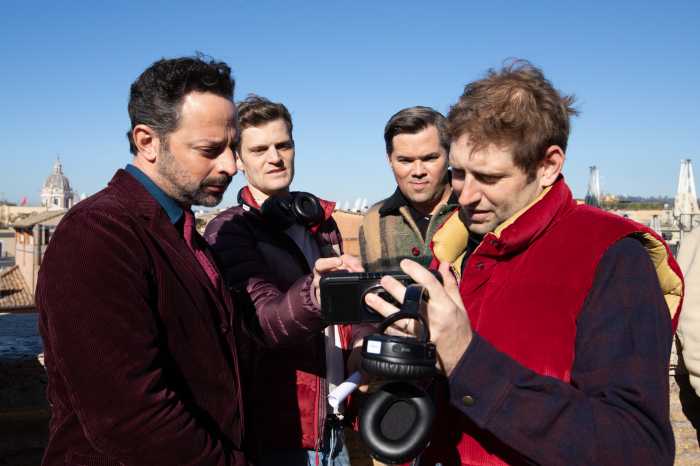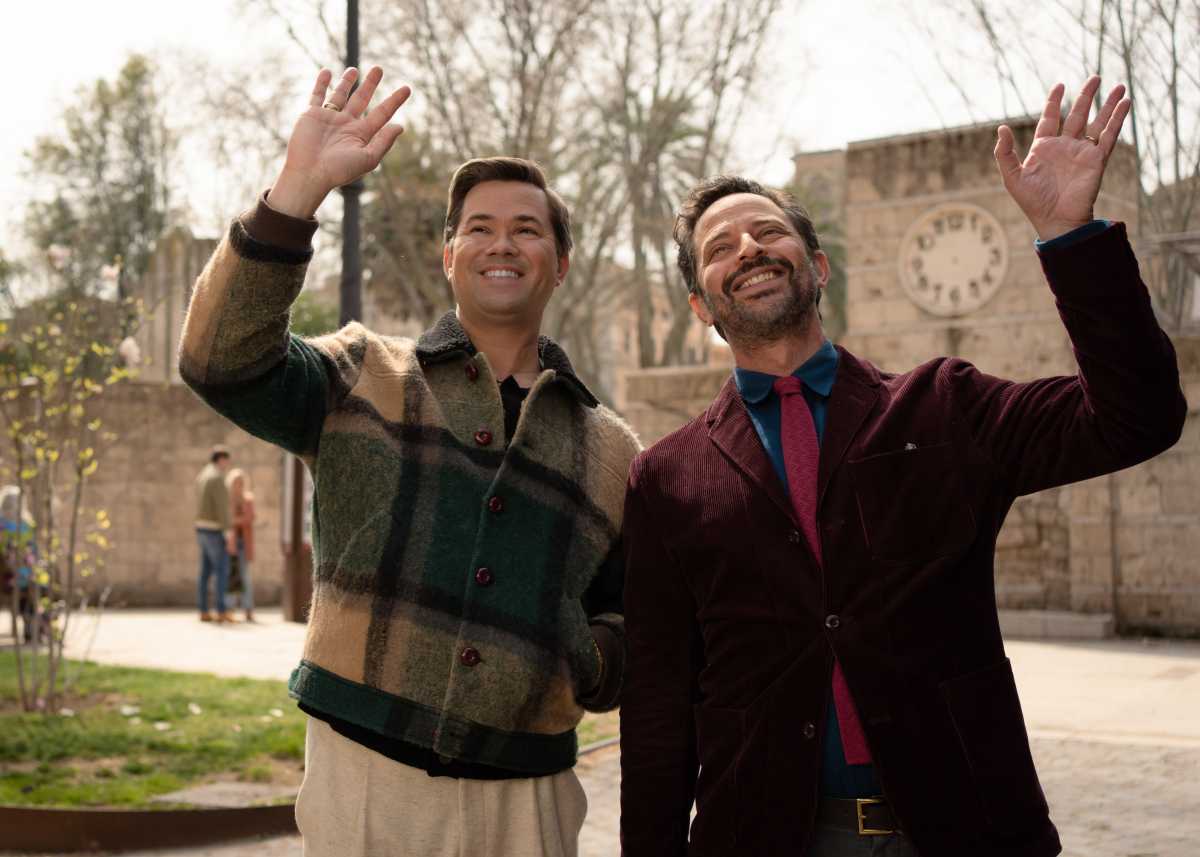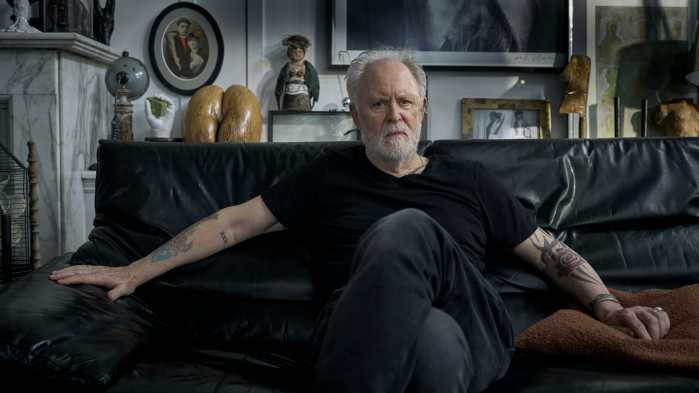“I Don’t Understand You,” written and directed by Brian Crano and David Joseph Craig, is a darkly humorous but very funny comedy about miscommunication. Married gay couple Dom (Nick Kroll) and Cole (Andrew Rannells) are celebrating their 10-year anniversary in Italy. During their trip they learn they will become fathers, as the pregnant Candice (Amanda Seyfried) has selected the couple to adopt her baby. However, this good news comes at an awkward time. Cole and Dom are in crisis mode, having made a very wrong turn on the way to a restaurant.
Lost and stuck in the woods in a storm, they mistake a local Italian farmer’s (Arcangelo Iannace) good intentions for evil. Likewise, when they do arrive at the intended restaurant, the owner, Zia Luciana (Nunzia Schiano), speaks only Italian, and they don’t understand her. (Subtitles reveal what Zia and the farmer are saying.) Making matters worse, Zia’s son Massimo (Morgan Spector) — who does speak English — arrives, but his accent is very thick, causing more confusion. As Dom and Cole suspect homophobia, tensions escalate, and accidents happen. The high-strung performances by Rannells and Kroll are inspired, and the film gets funnier with each outrageous mishap.
The filmmakers recently spoke with Gay City News about making “I Don’t Understand You.”

This film is inspired by your real life. What exactly happened and how did you use that to create the drama and tension of the film?
David Joseph Craig: Brian and I are espoused, and we were in the adoption process to have a child. It’s an emotionally difficult situation — at least our experience was. We had been scammed by a birth mother. We had a scheduled a 10th anniversary trip to Italy, and just before our trip, we found we had matched with the birth mother of our son. She was due in six weeks. We decided to make the trip our babymoon, rather than an anniversary trip, but on the night of our anniversary, we were in the middle of rural Italy and Brian directed me off the side of the road and we got stuck in a ditch for five and a half hours in the pouring rain. We thought that would be the start of an amazing horror movie that has hijinks and antics.
Brian Crano: Also, the emotional experience of being a presumptive parent feels not unlike a blonde lady walking into woods with a flashlight waiting to get cut up, so we realized there was this fun weird parallel we had not seen before.
“I Don’t Understand You” is a slow burn but then very hilarious comedy of manners and errors. How did you approach the material and develop the film’s tone?
Brian Crano: We knew where we wanted the characters to begin and we knew what we wanted to happen in the end, so it was, what’s the worst thing they can do next? What is the most complicating series of bad choices they can make that feels organic to what we might do in a similar situation? That’s the tone side of it. It was then a question for the characters — how far can you take it and still anchor what they are doing to this decision to have a child?
David Joseph Craig: To comment on the slow burn of it, we wanted to set up two true characters that you are on their side when complete mayhem ensues. You can stay on their side even if you hate everything they are doing. We don’t get to see that element in a queer couple that often. We really wanted to set up that relationship in a place that meant something to them and our true experience.
The film features wordplay and physical humor as well as some bloodletting. Can you discuss how you created the jokes and shocks and balancing the comedy and horror? I was laughing as the characters were sprayed with blood.
Brian Crano: That’s the kind of surprise we wanted to create for the audience — how am I responding this way to this horrific event? Building those [bloody] sequences was super fun from the perspective of characters’ mania and letting it spill over. The violence coming out of the misunderstanding all came from the title. If it is called, “I Don’t Understand You,” that should be the engine that drives all these insane behaviors.
Speaking of misunderstandings, you deliberately subtitle some of the characters’ dialogue to show viewers what is being said and reveal how it is being misinterpreted or misunderstood by Cole and Dom. Can you talk about that decision?
David Joseph Craig: That was a really fun find in the post-production process — when to use subtitles and when hold back on them so that the audience can participate in a way that feels organic and doesn’t ruin the joke. There is one point where a character repeats something three times, but we only reveal what she is saying on the third time because we really wanted not only the audience — if they don’t speak Italian — to misinterpret it, but also the characters to misinterpret it at the same time. Most of our Italian actors were strictly Italian speaking. They could have been saying anything. We were going with the hope that what we had written made sense.
Brian Crano: It was fun finding that some jokes begin where the set-up is in subtitles and the payoff is spoken. Seeing that land with an audience felt innovative.
The film finds some of its humor in mistaken homophobia. There is fear on both sides. Can you describe how you depicted discrimination? In many cases it wasn’t, but the characters perceive that it is, which makes it awkward and funny.
Brian Crano: We are so conditioned to feel unsafe when we leave Silverlake. I find myself feeling more uncomfortable [abroad] than I do at home. There was a level of that that we wanted to send up. Every time we felt in danger in these places, the Italians in our real life helped us out and did not harm us. Using the horror genre — is there something spooky in this room and is that going to get me? — that fear takes over and becomes the engine for Dom and Cole to do what they do.
David Joseph Craig: There is also something to say about the almost innate understanding of being catered to when you are traveling abroad as an American and expecting everyone to participate in and experience things in the same way you do here in America. At the root of it, you assume people will interrogate you in the same way they would back in the States. Even when it is a misunderstanding about their sexuality, the characters are not discriminating, just commenting.
What can you say about your communication skills with each other and with other people?
Brian Crano: Not great. [Laughs]
David Joseph Craig: Are you just going to leaving it at that, B?
Brian Crano: That’s the answer.
David Joseph Craig: I would say our communicating skills are very on point. We decided we would be almost brutality honest with each other to a fault. That helped us have a long-lasting relationship. We realized quickly that Brian and Nick take a note the exact same way, and Andrew and I take a note exactly the same way. Brian clued me that Andrew needs you to explain a little more and feel part of it, and for Nick, it was “Here’s the note, go do your thing.”
Brian Crano: I like my answer better, for the record.
Given your communication skills, how did you co-direct the film?
David Joseph Craig: Should I just answer that “Not great”? [laughs] I’m kidding.
Brian Crano: Because there is so much trust and lived experience, it was very easy is the short answer. It is great to be able to see your partner succeed in something while they are doing it. Most of the time, if David was working on a film, I would see the film and hear stories about how it went, but I wouldn’t be able to watch him be good at it. That was really sweet to be able to see, and it made the process really fun on a personal level. But in terms of dividing the labor was easy because our taste is the same and we had written it together, so we were always making the same movie.
David Joseph Craig: I concur.
What can you say about casting and working with the actors, who seem to align so well with you?
David Joseph Craig: Both come from comedy duos — Andrew with Josh Gad and Nick with John Mulaney — and they both really understood how to work as a comedy duo. On set, they would give away the punchline joke because they thought it would work better for the other actor. They worked as one the entire time and they brought own spin to the characters. I would have been much more angry the whole time if it was me. [Laughs]
Brian Crano: Often in a movie, you arrive on set and meet the actor and are told: “This is your husband.” There is no relationship, and no backstory, and it is all acting. Here you have two people who genuinely love each other. It was nice to see their real relationship and their partnership bloom throughout the process. We saw how loyal and devoted they are to each other off set and that ended up being what you see on screen.
Given that the characters would you do anything for their children, what was are your thoughts about real-life parenthood?
Brian Crano: Becoming so emotionally vulnerable to something — that that is something to take on in your adult life.
David Joseph Craig: Every day our child challenges us/him to be as vulnerable as possible and it is such a wonderful quality. Both of us are accident adverse. We don’t like participating in other people’s traumas, but our kid is a daredevil, and we have had situations with stitches. Being in the moment means this has nothing to do with me, I have to take him to the hospital immediately. You have no second thoughts. You are in it for your kid the second they show up.
“I Don’t Understand You” | Directed by Brian Crano and David Joseph Craig | Opening June 6 at the Regal Union Square, the AMC Kips Bay, the AMC Empire 25, and the AMC Lincoln Square | Distributed by Vertical Releasing



































